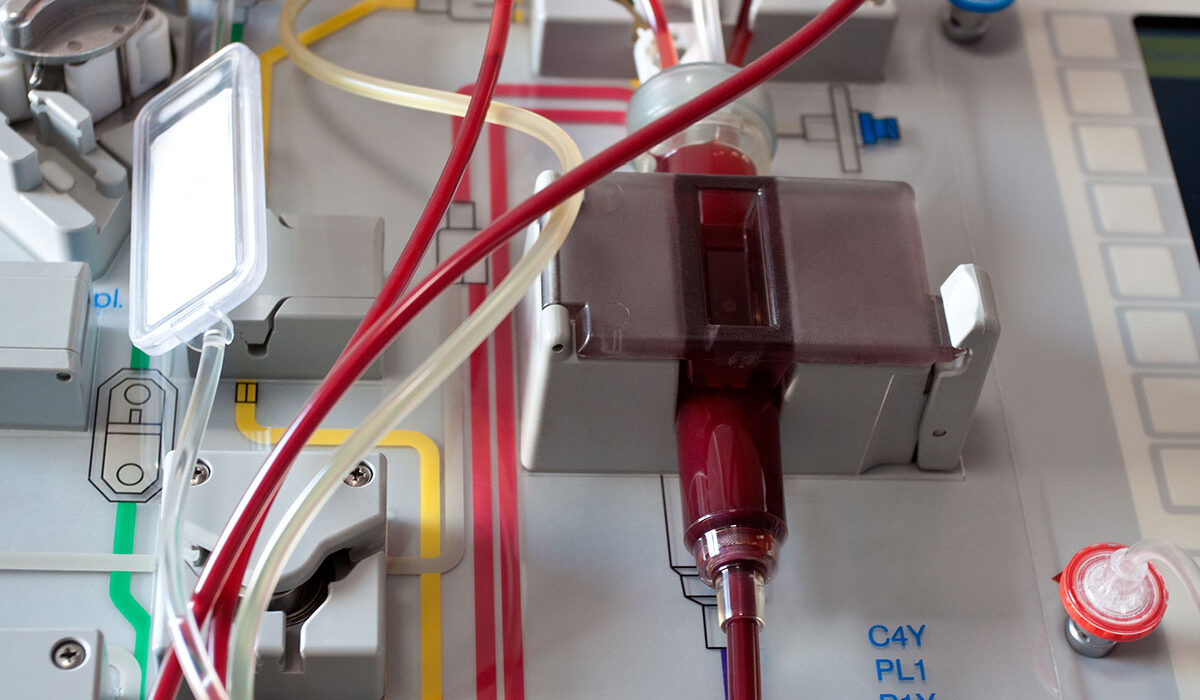2024-12-05 ワシントン大学セントルイス校
 Stem cell transplantation, using devices like the one shown here, is used to treat several types of blood cancers, but carries the risk of a life-threatening side effect called graft-versus-host disease. Results from a clinical trial conducted by researchers at WashU Medicine showed adding the investigational drug itacitinib to standard care for “half-matched” stem cell transplantation may reduce rates of the disease, in which the donor’s stem cells attack the patient’s healthy tissues. (Photo: Getty Images)
Stem cell transplantation, using devices like the one shown here, is used to treat several types of blood cancers, but carries the risk of a life-threatening side effect called graft-versus-host disease. Results from a clinical trial conducted by researchers at WashU Medicine showed adding the investigational drug itacitinib to standard care for “half-matched” stem cell transplantation may reduce rates of the disease, in which the donor’s stem cells attack the patient’s healthy tissues. (Photo: Getty Images)
<関連情報>
- https://source.washu.edu/2024/12/new-drug-tested-to-reduce-side-effect-of-half-matched-stem-cell-transplants/
- https://medicine.washu.edu/news/new-drug-tested-to-reduce-side-effect-of-half-matched-stem-cell-transplants/
- https://ashpublications.org/blood/article-abstract/doi/10.1182/blood.2024026497/526136/Itacitinib-for-Prevention-of-Graft-Versus-Host
移植片対宿主病とサイトカイン放出症候群を予防するイタシチニブ Itacitinib for Prevention of Graft-Versus-Host Disease and Cytokine Release Syndrome in Haploidentical Transplantation
Ramzi Abboud,Mark A. Schroeder,Michael P Rettig,Reyka G Jayasinghe,Feng Gao,Jeremy Eisele,Leah Gehrs,Julie K. Ritchey,Jaebok Choi,Camille N Abboud,Iskra Pusic,Meagan A Jacoby,Peter Westervelt,Matthew Christopher,Amanda F. Cashen,Armin Ghobadi,Keith Stockerl-Goldstein,Geoffrey L Uy,John F. DiPersio
blood Published:November 22, 2024
DOI:https://doi.org/10.1182/blood.2024026497
Key Points
- Itacitinib with haploidentical transplantation, when added to standard GvHD prophylaxis, was well tolerated without impairing engraftment.
- Itacitinib resulted in low rates of CRS, acute and chronic GvHD, and encouraging GRFS and overall survival after haplo-HCT.
Abstract
Haploidentical hematopoietic cell transplantation (haplo-HCT) is an increasingly used treatment for hematologic malignancies. Although post-transplant cyclophosphamide (PtCy) has improved graft vs. host disease (GvHD) prophylaxis in haplo-HCT, patients continue to experience life-threatening complications. IFN-γ and IL-6 are central in the pathophysiology of GvHD and cytokine release syndrome (CRS), and both cytokines signal through Janus kinase (JAK)-1. We tested the effect of adding the JAK-1 selective inhibitor, itacitinib, to PtCy-haplo-HCT to mitigate these complications and improve overall survival. This open-label, single-arm study evaluated the safety and efficacy of itacitinib combined with standard GvHD prophylaxis after haplo-HCT. A total of 42 patients were treated with itacitinib 200 mg daily from day -3 through +100 or +180, followed by a taper. Itacitinib resulted in low CRS grades, all patients had grade 0 (22%) or grade 1 (78%) CRS and there were no cases of grade 2-5 CRS. There were no cases of primary graft failure. No patients developed grade 3-4 aGvHD through day +180. The cumulative incidence of grade 2 aGvHD at day +100 was 21.9%. The 1-year cumulative incidence of moderate or severe chronic GvHD was 5%. The cumulative incidence of relapse at 2 years was 14%. Overall survival (OS) at 1 year was 80%. The cumulative incidence of nonrelapse mortality at day 180 was 8%. Itacitinib, when added to standard GvHD prophylaxis, was well tolerated and resulted in low rates of CRS, acute and chronic GvHD, NRM and encouraging rates of GvHD-free relapse-free survival (GRFS) and OS after haplo-HCT. NCT03755414


